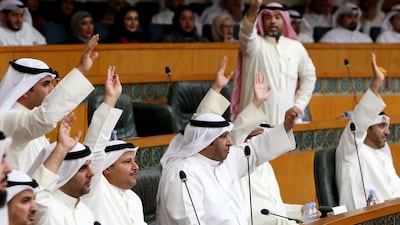Kuwait’s minister of commerce and industry has survived a vote of no-confidence over a property scandal that defrauded investors of 500 million Kuwaiti dinars (Dh6 billion).
Khaled Al Roudhan was accused by parliamentarians Al Humaidi Al Subaei and Mubarak Al Hajraf of failing to precent financial and administrative violations in a nine-hour grilling session held in the National Assembly on Wednesday.
The property scam was operated by foreign private sector companies that sold investment properties abroad for residents in the country through fraudulent transactions on plots of land or projects that they either failed to deliver or simply did not exist. About 11,000 people were affected.
Responding to the charges after three hours of questioning, Mr Al Roudhan said the timeline of allegations presented by his accusers was skewed to make a case against him.
“I know very clearly why I was grilled – it’s obvious,” the minister said, without elaborating.
Kuwaiti MPs often summon ministers for questioning to score political points and to express their opposition to the government before elections. The constitution allows the National Assembly to summon ministers for questioning, which has often resulted in fierce grillings over corruption allegations and led several ministers to resign in recent years.
After the questioning session, 10 MPs filed a motion of no confidence against Mr Al Roudhan even though it was unlikely to receive the 25 votes needed to pass in the pro-government parliament. When the motion to vote on his dismissal was brought forward on Wednesday night, the minister received 34 out of 50 votes in his favour, which all but killed the original motion that was set to take place on March 27.
Despite the overwhelming display of support for the minister, the parliamentary questioning exposed shortcomings by the commerce ministry that will need addressing during Mr Al Roudhan's tenure, according to the two parliamentarians who grilled him.
In particular, Mr Al Roudhan, who was appointed in December 2017 and kept his post during a cabinet shuffle last year, said he had not been given sufficient time to deal with the fraud nor was he responsible for the scandal.
“These companies are a mafia that functioned during a certain period and embroiled sons and daughters of Kuwait in a crisis. The moment I assumed the role of minister, I adopted the cause,” he said.
Mr Al Subaie said the property transactions required immediate response and the full attention of the ministry to prioritise the thousands who have been caught in the scam.
“The agreements made do not show a system of organisation or respect for the government organisations that work towards achieving economic development,” said Mr Al Subaei.
Mr Al Roudhan said he was addressing these issues and that 90 per cent of the cases dated from before his appointment to the ministry. The minister, who showed videos of several Kuwaitis who had fallen victim to the scam as a way of showing his involvement, said that more than 60 per cent of the cases had been transferred to prosecutors.
In June last year, under his purview, Kuwait banned 15 property companies from operating in the country and the law was amended shortly afterwards to limit the number of “real estate exhibitions” which parliamentarians claim are “traps” for Kuwaitis seeking to invest in property.
“At the same time I am getting grilled, I am having real estate companies sue me. I’ve come out innocent in that case, but I ask, why do you think those companies are suing me,” Mr Al Roudhan said.
The parliamentarians countered that poor ministry oversight of the scandal, coupled with general negligence, was proof enough of the minister's failure.
Separately, they also accused him of favouritism in granting funding to small and medium enterprises and of misusing public funds by hiring consultants from outside the ministry's ranks.
“All restaurants and all coffee shops. The funding goes to bakalas, hairdressers, restaurants; where are the funds for industry,” said Mr Al Subaei.
Mr Al Roudhan said that favouritism, although it did exist, has led him to fire the head of the Small and Medium Enterprises fund. But that the examples Mr Al Subaei brought up were in fact projects he approved of personally.
“To that, all those jobs are dignified industries. And the projects we finance represent what the fund is looking to finance. I don’t know what you want me to fund, a missile factory?” he said.

